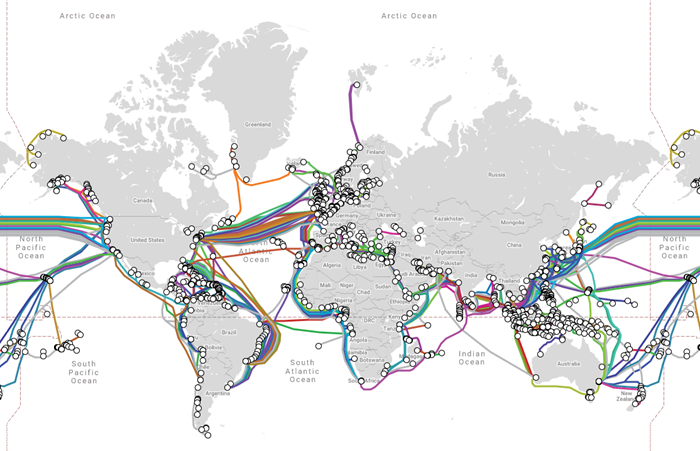If we were to compile a list of potential Internet doomsday scenarios, the ongoing coronavirus outbreak is likely to be a part of such lists – and for obvious reasons. Over the last few days, we have witnessed a sudden increase in the number of people who want to know whether coronavirus is going to break the Internet? During the outbreak, people are forced to work from home, and the lockdowns and the compulsion to stay indoors are resulting in an increased demand for bandwidth – whether it is for working, playing games, or watching the video! The Internet has become the main, if not the only, source of entertainment for most.[Source: www.submarinecablemap.com]
Can overuse bring down the whole Internet?
The answer to that question is – NO! In case an online service or website is overloaded with traffic, that particular website or online service could crash, but not the Internet. Overuse cannot bring down the whole Internet. When bandwidth consumption increases exponentially, from a demand and supply perspective, the speed can reduce. The more the users there are online, the lesser is the speed you will get normally. To get a better understanding of this, first, we need to understand how the Internet works.
How does the Internet work?
The Internet is not dependent on a single computer or a cable. It is a combination of several independent networks and computers. All the connecting computers and the cables together can be considered as the Internet, and so for the whole Internet to crash all the computers would have to crash and the connecting cables cut. The Internet is too big and decentralized to fail all at once. That is near impossible! These networks are largely governed, controlled, and maintained by individuals, businesses, and governments. If one part of the network stops working for some reason, users will still be able to access the Internet. [Source: By The Opte Project – Originally from the English Wikipedia; description page is/was here., CC BY 2.5, https://commons.wikimedia.org/w/index.php?curid=25698718]At a time when the majority of people work remotely from their homes, a significant portion of people would have already stopped accessing the Internet from their offices. It helps Internet Service Providers handle the demand-supply chain. That’s why major tech companies and Internet Service Providers are confident that no pandemic or other such event will ever take down the Internet and there is plenty of capacity in the network to accommodate everyone.
Is there absolutely no problem at all?
The lack of capacity in the network is not really a problem, to begin with. The fact that a significant number of users using the Internet in huge numbers induces performance slowdown. Mobile internet services are often the most affected, unlike fixed broadband ones. The reason being, a sudden rush of people on the mobile Internet. The Internet often experiences outages in difficult times and events such as major power blackouts where multiple networks and computers go out of service at the same time. Macro events like earthquakes, damage to underwater or over-land cables, damage to space satellites, large solar activity, large power outages, nuclear war, targetted cyberwar, etc., could cause sections of the Internet to crash theoretically. But this will not shut down the Internet! In 2007, Asia experienced a series of earthquakes that damaged undersea cables, further resulting in major Internet-related issues in some parts of the world. However, the rest of the world still continued access to the Internet.
Governments can swing into action
To endure the ever-increasing demand, in the present pandemic, the European Commission has asked OTT streaming services such as Netflix and YouTube to reduce their system demands on European web networks. The purpose is simple. OTT streaming and Internet companies must ensure that their services remain uninterrupted during the state of lockdown. According to Internet speed test firm Ookla, mobile broadband download speeds drastically declined in many Asian countries since the pandemic. Meanwhile, fixed broadband internet services didn’t take much of a hit. As more users come online, these companies need to be capable of accomodating the additional burden. Major technology companies cannot afford to face an outage at the moment, given the fact that most of the major companies are facing a shortage of employees working from offices.
The bottom line
According to reports, Internet usage has almost doubled in many parts of the world since the pandemic. In challenging situations where everything around us comes to a standstill, more aspects of our daily lives naturally the digital route. In fact, remote-work platforms like Microsoft Teams and Zoom continue to witness increased demand. In the case of India, an ISP told us that consumption could go up 80% in a situation where everyone is staying at home. Plus, the majority (90% +) of users access the Internet between 9 am to 11 pm (IST)! Many customers also upgrade their existing broadband plans that often stretch the bandwidth to a significant extent. However, in such a scenario, most Network Service Providers (NSPs) increase the overall bandwidth, which helps ISPs handle the additional load. Meanwhile, millions of people across the globe are now connecting to the internet from the comfort of their kitchens, living rooms, and home offices every day. As a result, the demand for uninterrupted Internet services continues to skyrocket. Be a responsible netizen, and don’t create or share digital junk! Always make sure to keep a safe distance from coronavirus COVID-19 scams, frauds, and cybersecurity threats.

